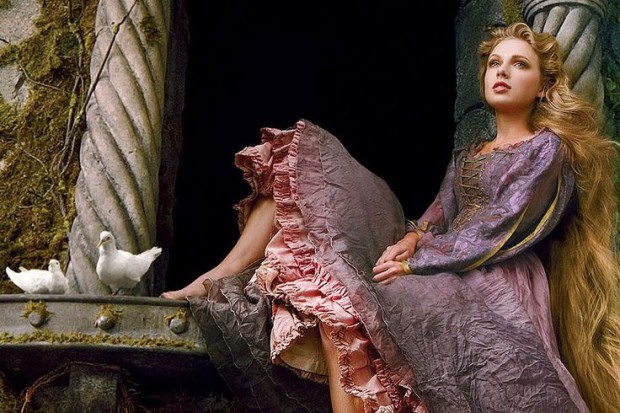Genre: Fairy Tale
Premise: After being abandoned by a prince who promised to rescue her, an unhappy Rapunzel vows revenge on him and his kingdom.
About: Damsel made last year’s Black List, but only barely. It’s written by former male model slash actor, Bryan McMullin, which means we’re going to be answering the question that’s been debated among screenwriters since the beginning of time: Is it possible to be a screenwriter and also be really really really really good-looking?
Writer: Bryan McMullin
Details: 115 pages
One of the stronger trends as of late has been the live-action fairy tale. Driven mainly by Disney’s obsession with live-actioning their entire animated catalogue, it’s opened the doors for spec writers to deconstruct the more popular fairy tale characters (Snow White) or build new stories around less popular characters (Prince Charming).
As spec writers, we don’t have too many options these days, which is why the fairy tale option is a tempting one. There are a bajillion characters to choose from, and since many are in the public domain, it allows you to do what the studios are doing (write high profile IP scripts) without paying for the rights.
Of course, technically speaking, you can write about anything. If you wanted to write a Batman movie, you could write one. It’s not illegal. But you have one potential buyer and that buyer is probably going with one of the top 3 screenwriters in the world over Joe Nobody.
I suppose if you wrote the best Batman script ever, they’d buy it. But I’m yet to see an amateur writer pull this off with any high profile property. I mean if you want a chuckle, search out all the fan-written Indiana Jones scripts. It gets ugly folks. You’re much better off delving into the fairy tale world.
Rapunzel started off as a good person, particularly since she was raised by a witch in a tower all by herself, her only friends being animals. Then one day, Prince Edward came along and everything went to shit.
After Edward promised to come back and save her, the witch caught wind of the plan and moved Rapunzel somewhere else. When Edward couldn’t find her in this new spot, Rapunzel decided he was an evil heartless liar and vowed revenge on him for as long as she lived. Hey, before you judge, keep in mind her best friend was a raccoon. She wasn’t exactly socially conditioned.
Many years later, Edward has a son, Prince Cavill. Cavill is driven into the woods by a siren song he’s been hearing since he was a child, and along the way, meets Elise, a cute but poor young woman who’s immediately taken by Prince Cavill, and he with her. Unfortunately, he’s still gotta see who’s at the end of the song rainbow, so he leaves E-leaves.
Of course, the song is a trick from Rapunzel to take Cavill hostage so she can get her revenge on Edward. When Edward puts out a reward for whoever brings his son back, Elise realizes she’s the only one who knows where he is, and heads after him.
In the meantime, King Edward’s wife, even more desperate to get her son back, lets loose the nastiest criminal in the kingdom’s prison, Vel, to find him.
With Elise, Vel, the king’s soldiers, and everyone else in the land who wants to collect that reward money looking for Cavill, he’ll most assuredly be rescued. Unless, of course, Rapunzel has some master plan in her back pocket. And as I like to say, never underestimate a woman who spends that much time on her hair.
Let’s talk about plot. What is plot? And how does it differ from story? They’re often confused and that’s because there’s some crossover between the two. The best way I can describe it is that plot is the ingredients and story is the meal. When you have a great meal, you don’t think about how much paprika was added, or how many onions they used, or how many minutes it was baked. You just enjoy the presentation and the taste.
Plot consists of all the mechanical beats (the ingredients) required to move the story along. So in The Force Awakens, all this stuff about Kylo Ren coming to Jakku to look for the map to Luke Skywalker, to figuring out how to make Rey and Finn meet up, to finding a way to have them run into Han Solo, to deciding when the First Order was going to blow up a star system… all that is plot.
Story is more about the choices you make that result in the most pleasing movie possible. The overall concept of finding Luke Skywalker and how captivating the characters are and how we move through the narrative, that’s story.
If that’s confusing, let me put it a different way. Take Gravity. Gravity’s story is Sandra Bullock desperately moving from outpost to outpost in space, air running out, trying to survive long enough to make it to earth. Good story! Let’s say instead, though, it was about a panel on the International Space Station that had broken, and Sandra Bullock had to fix it. That’s not a very good story, is it? It doesn’t lend itself to a lot of interesting choices that an audience would be entertained by.
Why do I bring this up? I bring it up because a lot of writers get bogged down in plot to the detriment of their story. And there are two ways this happens. One, they simply add more plot than the story can handle. Every single scene is desperately trying to keep up with explaining what’s happening. Two, they’re not good at conveying plot CLEARLY. So even if the amount of plotting is average, they don’t hold our hand enough and clearly convey what’s happening enough, to keep things clear.
This happens all the time when you’re watching bad movies. You’ll forget what’s happening, why it’s happening, or what we’re doing at the moment. You’ll often chalk this up to “this movie is stupid.” What probably happened was the writer wasn’t being clear enough in regards to key plot beats.
I point this out because Damsel has a ton of plot, and yet it never gets in the way of the story. I mean we have to establish this whole backstory of how Rapunzel became the way she did. We have to establish King Edward visiting her, this evil witch’s plan, King Edward growing up, his son coming to Rapunzel, this forest girl he runs into, this plan to rescue the prince from several different groups. There’s a shit-ton of information here.
And yet I was never once confused because McMullin was so damn clear about everything. You could almost feel the dedication to clarity. Each section (for example, the King Edward visits Rapunzel section) is its own little story. It’s not some hastily-written piece of setup that’s only there to get us to the real story. Every moment is important.
And the writing is really good and really sparse. Why is sparse important? Because there are less words to overburden the reader with information. You guys give me shit sometimes for saying, “Stay under 4 lines per paragraph!” and yet the large majority of paragraphs in Damsel are 1 or 2 lines.
Simply put, this was a really enjoyable screenplay. If you’re a beginner screenwriter, in particular, try and get your hands on this script. You can learn a lot from it.
[ ] What the hell did I just read?
[ ] wasn’t for me
[xx] worth the read
[ ] impressive
[ ] genius
What I learned: Never write a section just to get to (or “set up”) the next section. EACH SECTION SHOULD BE ENTERTAINING IN ITS OWN RIGHT.
What I learned 2: Too much plotting is dangerous. If every scene feels like you’re trying to keep up with all the information you have to convey, you have too much plot. Figure out a way to strip some of that plot out so that you can focus on making scenes entertaining.



